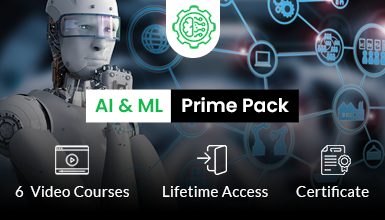

Artificial Intelligence and Machine Learning certification at Tutorials Point ensures your professional success in the industry. The certification is specifically designed to assist you in implementing AI and ML from scratch. You will gain in-depth knowledge that will enable you to understand the opportunities and challenges in the AI and ML domains.
Artificial Intelligence and Machine Learning gained immense popularity due to their tremendous potential in transforming the world around us. From curating large sets of complex data to predicting the buyer’s pattern, the combination of these two technologies has proven to be a game-changing innovation. According to the CEO of Google, Sundar Pichai, artificial intelligence will have a greater influence on humanity than fire, electricity, and the internet combined.
At the core of Industry 4.0, AI and Machine Learning bridge the gap between humans and machines. It drives the transformation of human lives and world economies. Many businesses are leveraging these technologies to improve performance and overall productivity. However, AI and Machine Learning, at the moment, face a shortage of skilled professionals. It is about time to master these ever-expanding and game-changing technologies.
This certification will teach you the concepts of real-world case studies and AI projects. With the aid of the Python language, we will cover topics such as Data Analysis, Machine Learning algorithms, Natural Language Processing, Deep Learning, Neural Networks, Tensors, and Regression.
On average, a Machine Learning engineer makes $145,296 per year in the US.
Machine Learning is advancing across many industries, including finance, healthcare, IT, cyber security, CRM, and human resources.
It is anticipated that 97 million staff will be needed in businesses connected to artificial intelligence by 2025.
Artificial Intelligence (AI) and Machine Learning (ML) enhance a business's digital services. They can optimize the overall business operations resulting in increased customer satisfaction. They can mine through unstructured data and make complex decision-making relatively easier.
AI and Machine Learning are already showing their presence in how we live and work. As more modern business operations adopt AI and ML for organizational success, their future scope shows promising growth.
Build your own artificial intelligence framework with an industry-relevant curriculum.
Combine Deep Learning, Machine Learning ML, and other Artificial Intelligence AI technologies for improved business operations.
Understand and solve different problems with practical machine learning for data analysis using Python.
In-depth details of advanced algorithms: time series, linear regression, multiple and logistic regression, and decision trees.
Fundamental principles and tools for data analysis, data visualization, and steps in exploratory data analysis.
Understand Machine learning Deep Learning with Keras and create step-by-step instructions for your own neural network in Python.
12 real-world case studies and a Python project to help you understand latest trends and improve your CV.
Programmers, students, data scientists, engineers, analytics professionals, business heads, beginners, job aspirants, and passionate learners can find this certification beneficial. It helps with the training of those who wish to enhance their projects with Artificial Intelligence and Machine Learning.
Master the field of artificial intelligence by learning the fundamental principles
Knowledge of essential tools for data analysis
Discover the exploratory data analysis workflow, the Numpy concept for Data Analysis, and more.
Gain knowledge of the top Python libraries for data science, including NumPy, Pandas, and Matplotlib
Comprehend fundamental Python programming ideas with real-world case studies.
Compile code and run real-world Python programs
Implement machine learning in the real world
Build real-world projects using the tools and techniques
Prepare for job interviews with the latest concepts in the industry, Python and core ML libraries, statistics, and machine learning models along with knowledge of relevant software.
